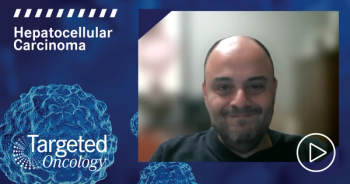
Defining the Role of Adjuvant Therapy for HCC
A brief discussion on the potential role for adjuvant therapy in patients with hepatocellular carcinoma.
Episodes in this series

Transcript:
Aparna Kalyan, MD: I’m curious to know, I’ve seen a few more of these cases recently. The space of adjuvant therapy is unknown, we’ve had a lot of missed hits in that space for multiple reasons. Dr Kim, I’m curious, we see this a lot. I have a patient who has a Child-Pugh A score, has a large lesion, around 4 or 5 cm, for other reasons not necessarily related to the tumor is not a surgical or a transplant candidate, and we treat them with Y-90 [yttrium-90 radioembolization], which is the standard in this space. Are there situations where your team discusses adjuvant therapy for those patients? I know there are trials ongoing, but I’m just curious to know how you approach it.
Edward Kim, MD: Yes, absolutely, let’s say this is a nice, clean, Child-Pugh A patient with a 5-cm lesion, well-encapsulated HCC [hepatocellular carcinoma] without elevated AFP [alpha-fetoprotein] or any extrahepatic disease, vascular invasion, and who is not a transplant or resection candidate. We would treat them with radioembolization, and that would be it for us. We wouldn’t add any adjuvant therapy to that because the assumption here is that it’s probably a well-differentiated HCC, not really showing any signs of aggressive tumor biology, and we would just follow those patients at 3-month intervals for the first year, and then every 4 months. But if there was any reason for doubt of that type of well-differentiated HCC, elevated AFP, maybe above 200 or 400 [ng/mL], or if there is any hint of vascular invasion, or let’s say that 5 cm is not well encapsulated but it has more of an infiltrative appearance to it, those types of presentations then give us pause. Even if they have a complete response according to modified RECIST on follow-up imaging to the Y-90, we would either closely monitor them or start them on a systemic regimen for fear that it has an aggressive tumor biology that could manifest itself later on, either extrahepatic or elsewhere in the liver.
Aparna Kalyan, MD: You’re absolutely right, I’ve seen more of those questionable infiltrative-type pattern or questionable vascular invasion, questions about what do we do because they’re high risk. Dr George, what are your thoughts on this?
Ben George, MD: It’s a tough problem. Like you said, maybe because of the selection bias, but at tertiary centers, you tend to see more of these cases where the answer is not very clear. There is one dominant lesion, a couple of other lesions that look small and indeterminate, the appearance and the biology seem somewhat aggressive. Do we stop with just locoregional treatment to the dominant tumor, or do we do something else on the back end, particularly if the patient is not deemed to be a transplant candidate? We struggle with this just like others. In general, what I have favored, if there is clearly not a lesion that can be followed to assess response after locoregional therapy, is to do a short interval follow-up to get a sense of what the biology is, and then incorporate systemic therapy at that point. For the patient for whom transplant is not an option, the options become easier, where if the AFP did not normalize within a certain time after liver-directed therapy, should we just throw in the systemic therapy and watch them longitudinally over time? Then every so often, you run into a severe…toxicity, and then you’re kicking yourself and thinking why did I do this? I don’t know that there is a right answer.
Aparna Kalyan, MD: No, I think you’re right. We all struggle with that. But I’m hoping that’s the area where the new data will help us understand more.
Transcript edited for clarity.












































